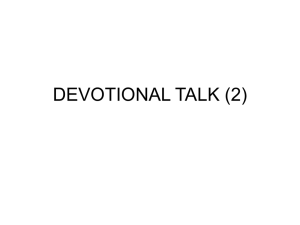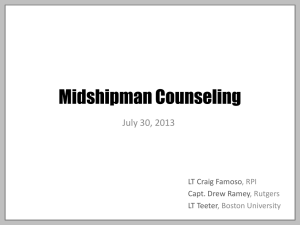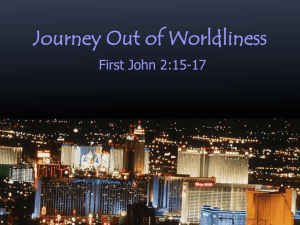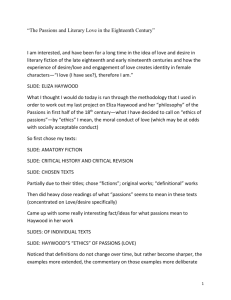How People Change – Part 1 – Slides
advertisement
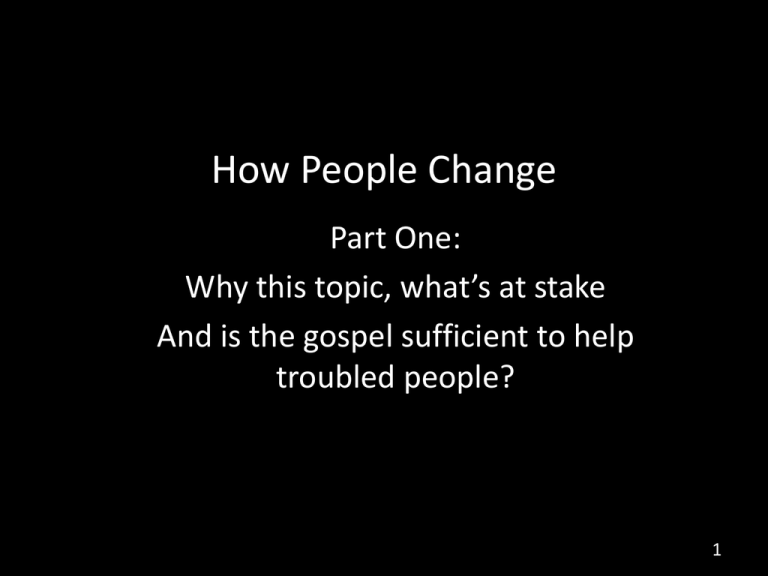
How People Change Part One: Why this topic, what’s at stake And is the gospel sufficient to help troubled people? 1 Jesus comes with a ‘change agenda’ 11For the grace of God has appeared, bringing salvation for all people, 12training us to renounce ungodliness and worldly passions, and to live selfcontrolled, upright, and godly lives in the present age, 13 waiting for our blessed hope, the appearing of the glory of our great God and Savior Jesus Christ, 14 who gave himself for us to redeem us from all lawlessness and to purify for himself a people for his own possession who are zealous for good works. 15Declare these things; exhort and rebuke with all authority. Let no one disregard you. 2 The full range of verbal behavior Declare these things; exhort and rebuke with all authority. Let no one disregard you. •Declare (laleo) – Used frequently of general speech. Discuss, converse, talk •Exhort (parakaleo) – a more specific kind of speech: To encourage, admonish, consolation, comfort •Rebuke: (elegcho) – an even more specific kind of speech: to call a person to account; to chide; to show some one his/her fault. 3 What are ‘these things?’ Titus 1: “for the sake of the faith of God’s elect and their knowledge of the truth, which accords with godliness” •It has something to do with using the entire range of verbal behavior to help people live in a radically Godcentered world •“It is a sacred leaven that spreads itself into the whole soul: 'the very God of peace sanctify you wholly' (I Thess. 5:23). There is light in the understanding, order in the affections, pliableness in the will, exemplariness in the life.”. 4 For the grace of God appeared… ‘Training us to renounce ungodliness’ •Ungodliness is a way of seeing the world, a way of perceiving others, a way of relating to material things, a way in which one relates to the stuff of life without God ‘Worldly passions’ (epithumiai) •Worldly passions are wrapped up in inordinate desires embodied in things like: ‘Will you like me’; or Can I control you; or I want to feel good; or give me more money 5 No other counseling theory will say: “These inward trials that I employ From sin and pride to set thee free; And break thy schemes for earthly joy That thou mayest seek thy all in me…” John Newton: “I asked the Lord” 6 The apologetic power of change John 13:34 A new commandment I give to you, that you love one another: just as I have loved you, you also are to love one another. 35 By this all people will know that you are my disciples, if you have love for one another.” John 17: 20"I do not ask for these only, but also for those who will believe in me through their word, 21 that they may all be one, just as you, Father, are in me, and I in you, that they also may be in us, so that the world may believe that you have sent me. 7 What we are up against We live in a culture with very well organized, very well thought out, mature and sophisticated explanations for what human beings are like. This point of view presents a different truth (than Christian truth), a different word on the soul of man, a different view on suffering, on relationships and on who can help people. 8 The ‘founders’ of psychology knew what they were subverting “The words a secular pastoral worker might serve as a general formula for describing the function which the analyst has to perform in relation to the public. I look forward to the day when there will be a ‘Salvation Army’ of mental health personal in every town and village” (Freud) 9 Patients force the psychotherapist into the role of priest and expect and demand from him that he will free them from their distress – that is why we as psychotherapists must occupy our selves with problems strictly speaking belong to the theologian. Jung 10 D. Powlison on motivation “Theories of what makes people tick incarnate into counseling models. Explanations are signposts to solutions: take medication, experience reparenting, cast our a demon, get your needs met, don’t make big decisions on bad star days, reprogram you inner monologue, explore your pain. Presumed reasons and appropriate responses are fiercely debated… 11 Does the scripture contain an explanation? But the Lord God has a great deal to say on the issue. He vigorously rebuts the contenders and counterfeits by demonstrating that human motivation has to do with Him. Counseling that aims to arise from Scripture must do justice to what God says about the whys and wherefores of the human heart. Scripture claims to search out the ‘thoughts and intentions of the heart’ according to specific criteria by which the Searcher of hearts evaluates what He sees in us (Heb. 4:12-13) 12 Theories of why people do what they do (motivation) • Determine how we help (treatment) • how we view circumstances (the impact of social environment) • and even who can help (Are Pastors/pastoral leaders and others even qualified to help troubled people) 13 Caveat 1. The nearside of complexity is simplistic. • When the scriptures are applied to the complexity of life in ways that are ‘pat’ and not deep it tends to make the scriptures seem irrelevant or even doubtful 2. The far side of complexity is simple: • People have a story (and it needs to be heard). • There is a process in which the gospel’s truth are applied compassionately, and patiently. 14




